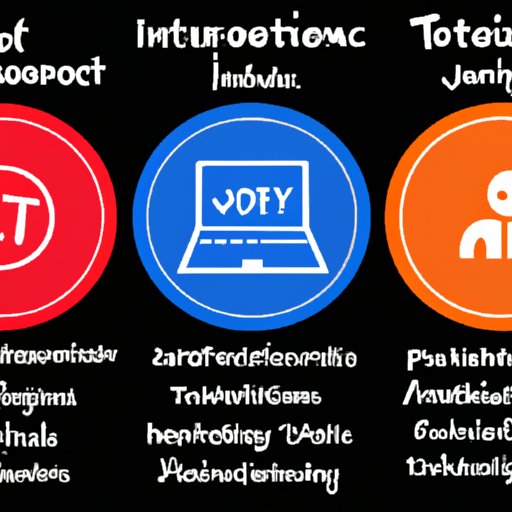Introduction
Information technology (IT) jobs are a growing industry that offers a wide range of career opportunities. IT professionals are responsible for designing, developing, implementing, and managing computer systems and networks used by businesses and organizations. They must be knowledgeable in a variety of areas such as hardware, software, networking, data management, and security. With the ever-increasing demand for technology, IT jobs offer a stable and rewarding career path for those with the necessary qualifications.

Types of IT Jobs and Their Responsibilities
There are many different types of IT jobs available, each with its own set of responsibilities. Some of the most common IT job titles include:
Network Engineers
Network engineers are responsible for designing, configuring, and maintaining computer networks. They must have knowledge of network hardware, software, protocols, and standards. Network engineers must also be able to troubleshoot network problems and resolve them quickly and efficiently.
System Administrators
System administrators are responsible for installing, configuring, and maintaining computer systems. They must be knowledgeable in operating systems, applications, and system security. System administrators must also be able to troubleshoot system issues and provide technical support when needed.
Database Administrators
Database administrators are responsible for managing databases. They must have knowledge of database design, implementation, and maintenance. Database administrators must also be able to troubleshoot database issues and ensure that data is secure and backed up regularly.
Security Professionals
Security professionals are responsible for protecting computer systems and networks from unauthorized access, theft, and other malicious activities. They must have knowledge of security principles, techniques, and technologies. Security professionals must also be able to identify potential security threats and develop strategies to prevent them.
Web Developers
Web developers are responsible for creating web applications and websites. They must have knowledge of web programming languages, frameworks, and tools. Web developers must also be able to troubleshoot web development issues and ensure that websites are secure and accessible.
Software Developers
Software developers are responsible for designing, developing, and testing software applications. They must have knowledge of software engineering principles and programming languages. Software developers must also be able to troubleshoot software issues and ensure that applications are secure and reliable.
Technical Support Specialists
Technical support specialists are responsible for providing technical assistance to customers. They must have knowledge of computer hardware, software, and networking. Technical support specialists must also be able to troubleshoot customer issues and provide solutions in a timely manner.
Qualifications Needed to Become an IT Professional
In order to become an IT professional, there are certain qualifications that must be met. These include:
Education Requirements
Most IT jobs require a minimum of a bachelor’s degree in a related field such as computer science, information technology, or software engineering. Some positions may require a master’s degree or additional certifications.
Certifications
Many employers require IT professionals to have certifications such as CompTIA A+, Network+, and Security+. These certifications demonstrate a level of knowledge and proficiency in specific areas of IT.
Soft Skills
In addition to technical skills, IT professionals must also possess soft skills such as problem-solving, communication, and customer service. These skills are essential for success in any IT job.
How to Find Information Technology Jobs
Finding an IT job can be a daunting task, but there are several resources available to help. These include:
Online Job Boards
Online job boards such as Indeed and Monster are a great way to search for IT jobs. These sites allow users to search by location, job title, and experience level.
Professional Organizations
Professional organizations such as the Association for Computing Machinery (ACM) and Institute of Electrical and Electronics Engineers (IEEE) offer job postings and networking opportunities for IT professionals.
Networking
Networking with other IT professionals is an effective way to find job openings. Attending conferences, seminars, and other events is a great way to meet potential employers and make connections.

Salary Expectations for Information Technology Professionals
The average salary for IT professionals varies depending on location, experience level, and type of position. According to the Bureau of Labor Statistics, the median annual wage for computer and information technology occupations was $88,240 in May 2019.
Average Salaries
The following is a list of average salaries for some popular IT jobs:
- Network Engineer: $96,000
- System Administrator: $77,000
- Database Administrator: $93,000
- Security Professional: $105,000
- Web Developer: $73,000
- Software Developer: $107,000
- Technical Support Specialist: $53,000
Location Factors
Location can also affect salary. For example, according to Robert Half Technology’s 2020 Salary Guide, the average salary for a software developer in New York City is $128,250, while the average salary for a software developer in Phoenix is $106,750.

Career Advancement Opportunities in the IT Field
The IT field offers many opportunities for career advancement. Some of these include:
Job Mobility
IT professionals often have the opportunity to move up within their current organization or to take on new roles in other companies. This allows IT professionals to gain valuable experience and explore new career paths.
Mentoring Programs
Many organizations offer mentoring programs to help IT professionals develop their skills and reach their career goals. These programs provide guidance and support from experienced professionals who can offer advice and help navigate the job market.
Specialization
IT professionals can specialize in specific areas such as security, database administration, software development, or web development. Specializing in a particular area can lead to higher salaries and more job opportunities.
Conclusion
Information technology jobs are a growing industry that offers a wide range of career opportunities. With the right qualifications and experience, IT professionals can find rewarding and lucrative careers. Furthermore, there are many opportunities for career advancement, including job mobility, mentoring programs, and specialization. If you are looking for a challenging and rewarding career, then consider pursuing a career in IT.
(Note: Is this article not meeting your expectations? Do you have knowledge or insights to share? Unlock new opportunities and expand your reach by joining our authors team. Click Registration to join us and share your expertise with our readers.)
